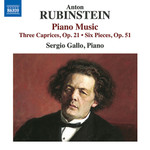|
Back
12/16/2022
“Piano Music”
Anton Rubinstein: Three Pieces, opus 16 – Three Caprices, opus 21 – Two Pieces, opus 28 – Six Pieces, opus 51
Sergio Gallo (piano)
Recording: Hahn Hall, Music Academy of the West, Santa Barbara, California (December 13, 2021) – 72’20
Naxos 8.574300 (Distributed by Naxos of America) – Booklet in English

   
One of the most prolific composers of the 19th century, Anton Rubinstein was influenced by Mendelssohn and Meyerbeer, and in 1862 he founded the St. Petersburg Conservatory. Having studied under Siegfried Dehn in Berlin, Rubinstein’s formulations were closely aligned with Western Europe. He frequently butted heads with “The Mighty Five”, a consortium of composers destined to create music that identified as distinctively Russian. Rubinstein could tap into any genre, one being opera, including The Demon, and he also wrote six symphonies and concertos. But the emphasis on his artistry would turn to virtuosic abilities on the piano. He also created pieces for four hands and even tone poems.
Following in the footsteps of Franz Liszt as a masterful pianist, the Hungarian was ambivalent towards the Russian and considered Rubinstein a “Pseudo-musician of the Future”. Rubinstein’s music has been cited as unevenly scored, and from this reviewer’s point-of-view, was evidenced in the opera The Demon; however, when turning the page to piano compositions, and in particular, this Naxos recording, the music is silky smooth and absolutely enchanting.
Noted Steinway artist and Brazilian, Sergio Gallo concentrates his effort on the Romantic era. One can hear his connection to these pieces, filled with ardor and efficiency: a delicate edging, yet mighty in pockets of dramatic regale. Each of the pieces inside opus 16 “sing” beautifully and contain delightful swells of pitches and turns, suffused by lyrical freedom. Each composition has a story to tell, certainly veiled inside a softer version of Chopin, the compositions are endearing to the core.
A caprice, in the most literal term, directly translates into unexpected twists and turns. Certainly so, as there is much more tension inside the Three Caprices. Each of the three movements is independent yet totally connected. M. Gallo’s performance is beautifully nuanced, nudging notes where needed, yet retrenching where critically needed.
The opening “Nocturne” inside Two Pieces has strong lines into Frédéric Chopin, yet Rubinstein’s composition is more restrained and bold within. But there’s a beautiful contrast which Rubinstein chose to compose in the segue “Caprice”: undoubtedly, it is fresh with mild hints of flittering deviousness. Catapults are brisk, unannounced and filled with delightful enclaves of devilish delight, and the closing denouement is understated yet ravishing. Smooth and sleek in parts, Sergio Gallo gives a spectacular reading of this highly vivacious and spirited œuvre.
Open the capsule of case studies as we turn to the Six Pieces with its journey inside a range of mild emotions. Sergio Gallo takes a dignified and thoughtful stance into these characterizations, each one eliciting precious thoughts and careful reflections. The pianist pays close attention into the beautiful swells and retrenchments that give poignant nuances to the movement. Rubinstein’s compositions fall light and airy, and sincerely need an opportunity to hear through headsets. Nothing harsh hits the ear, so a 6-term journey through reflections is speactacular! Sergio Gallo exquisitely unfolds the thoughts with delicate discernment. Brilliant.
The collection of pieces by Anton Rubinstein is a mini-treasure trove. Delicate, tasteful and irresistible.
Christie Grimstad
|